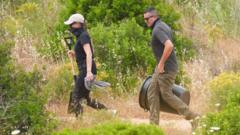In a significant development in the ongoing case of Madeleine McCann, nearly 16 years since her disappearance, Portuguese and German authorities have commenced a new search operation in Algarve, Portugal. The investigation, which originally began after the three-year-old vanished in Praia da Luz on May 3, 2007, has become one of the most recognized missing persons cases in Europe.
On Tuesday, police began excavating an abandoned building about 3.5 miles from the site where Madeleine was last seen. This renewed search effort, authorized by German prosecutors, involves exploring 21 locations between the child's last known whereabouts and where a German suspect had been residing at the time. Following initial reports, parts of the area have been cordoned off as investigators embark on this endeavor expected to continue until Friday.
The coordination of this search has prompted the arrival of around 30 German officers and several resources from the Portuguese fire department, who have assisted in clearing vegetation and draining nearby wells in hopes of uncovering crucial evidence. Former missing children chief, Charlie Hedges, indicated that the broader approach taken in this search might suggest authorities are exploring multiple avenues, although they likely have compelling justifications to execute the search warrants.
Notably, this investigation has received renewed momentum since German authorities identified Christian Brückner, a 48-year-old suspect currently serving time in Germany for an unrelated crime, as a person of interest in Madeleine's case. Although he has denied any wrongdoing concerning her disappearance, investigators remain focused on his connections to the time and location of her abduction.
Despite no definitive charges brought against Brückner regarding McCann's case, authorities continue to investigate, with British police involved through Operation Grange, which has spanned over a decade and approximately £13.3 million in costs.
However, as investigators strive to sift through areas of interest from past inquiries, Jim Gamble, who once led a case review in 2010, noted that earlier oversights in the first investigation may necessitate this updated search. The use of advanced forensic technology could yield insights previously unattainable during the initial inquiries.
While the child's parents have voiced their commitment to pursuing every lead, they mourn another year without answers. With new developments unfolding, the hope remains that this search might finally yield the breakthrough needed to solve this harrowing mystery.
On Tuesday, police began excavating an abandoned building about 3.5 miles from the site where Madeleine was last seen. This renewed search effort, authorized by German prosecutors, involves exploring 21 locations between the child's last known whereabouts and where a German suspect had been residing at the time. Following initial reports, parts of the area have been cordoned off as investigators embark on this endeavor expected to continue until Friday.
The coordination of this search has prompted the arrival of around 30 German officers and several resources from the Portuguese fire department, who have assisted in clearing vegetation and draining nearby wells in hopes of uncovering crucial evidence. Former missing children chief, Charlie Hedges, indicated that the broader approach taken in this search might suggest authorities are exploring multiple avenues, although they likely have compelling justifications to execute the search warrants.
Notably, this investigation has received renewed momentum since German authorities identified Christian Brückner, a 48-year-old suspect currently serving time in Germany for an unrelated crime, as a person of interest in Madeleine's case. Although he has denied any wrongdoing concerning her disappearance, investigators remain focused on his connections to the time and location of her abduction.
Despite no definitive charges brought against Brückner regarding McCann's case, authorities continue to investigate, with British police involved through Operation Grange, which has spanned over a decade and approximately £13.3 million in costs.
However, as investigators strive to sift through areas of interest from past inquiries, Jim Gamble, who once led a case review in 2010, noted that earlier oversights in the first investigation may necessitate this updated search. The use of advanced forensic technology could yield insights previously unattainable during the initial inquiries.
While the child's parents have voiced their commitment to pursuing every lead, they mourn another year without answers. With new developments unfolding, the hope remains that this search might finally yield the breakthrough needed to solve this harrowing mystery.


















